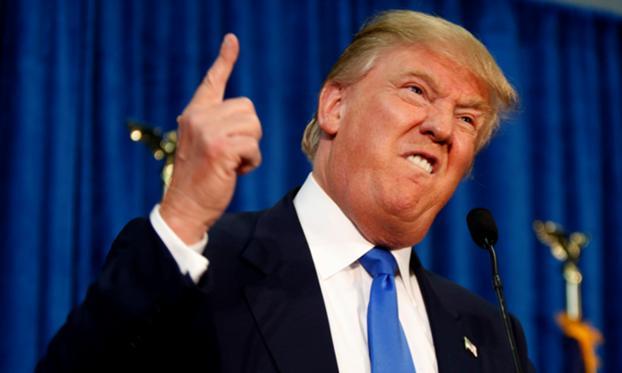Donald Trump and the Lack of Media Accountability
Posted on 04/13/2016 @ 07:45 PM

Photo Credit: Dominick Reuter/Reuters
By: Mark Salay, LULAC National Communications Intern
Donald Trump has held a monopoly on the media since announcing his presidential campaign with an onslaught of gross lies targeting minority communities. Coverage of Trump has spiraled out of control, but the media has been the enabler in normalizing Trump’s campaign of hate by putting aside its core duty of holding public figures accountable for their actions.
Last November, in one of the biggest examples of free media attention given to a presidential candidate, Saturday Night Live invited Trump to host despite loud opposition from protesters, including LULAC. SNL is known for having politicians appear on the show during election season; however, having a presidential candidate serving as host during election season is a rarity.
It was an insult to the more than 50 million Latinos in this country that such an iconic program would sell out for the sake of a few cheap laughs, considering NBCUniversal previously announced they would break business ties with Trump right after he labeled Mexicans as rapists, criminals, and drug dealers.
Whether the coverage is satirical or serious, the media -- television, radio, newspapers and magazines, and online -- has been more than happy to play along with Trump’s joke by constantly expanding coverage of him. Soundbites of him scapegoating Latinos and other minorities are on constant rotation, followed by more soundbites of him insulting the disabled, women, and veterans.
More Trump equals more ads sold, higher ratings, and more story clicks. But by promoting wall-to-wall Trump coverage, the media has profited greatly at the expense of minorities and other underrepresented groups.
CBS CEO Leslie Moonves commented on the race in February by confirming how the media has prioritized profit in its Trump coverage, “Who would have thought that this circus would come to town? But, you know -- it may not be good for America, but it’s damn good for CBS, that’s all I got to say. So what can I say? It’s -- you know, the money’s rolling in, and this is fun.”
But for many of the groups targeted by Trump, this is not fun. This is dangerous. In addition to scapegoating minority groups, Trump actively encourages his supporters to use violence against protesters.
The result is widespread violence at Trump rallies. Protesters are getting sucker punched, a teenager was pepper-sprayed, and an African American woman was shoved back and forth by a group of individuals. Instances of verbal abuse by supporters is another example of hate at his rallies, with one instance of a man yelling at black protesters, “Go back to Africa”.
A Trump rally in March scheduled to take place at the University of Illinois at Chicago, a school with nearly 25 percent Latino students, was called off after students of the university began a petition to cancel the event. Students cited safety concerns because of Trump’s statements and outbreaks of violence at Trump rallies that were often directed at protesters.
“As an undocumented UIC graduate student, I feel unsafe knowing that Trump along with his followers will be at my university,”
wrote Jorge Mena Robles, the creator of the petition.
“It’s become clear that his rallies are not just political events but mobilizing moments for active hate groups to amass.”
Despite outbreaks of violence incited by Trump and his supporters, Trump continues to not only dominate the media, but also dictate the terms. When Fox News turned down Trump’s request to change moderators for the last GOP debate before the Iowa caucuses in February, Trump decided to skip the debate. The message was clear that Trump would only allow access if he was able to control the narrative. It wasn’t until last month that NBC’s Sunday morning news program Meet the Press finally stopped allowing Trump to call in by phone, a practice used by him throughout his campaign to dodge questions and maintain control over the conversation. Sunday morning programs have conducted at least 28 phone interviews with him, a privilege not given to other candidates.
But why didn’t this happen earlier? Why has it taken this long for the media to hold him accountable?
Even as Trump has endured more recent criticism from the press (he has come under severe scrutiny for saying women deserve to be punished if they choose to have an abortion), it is still not enough to deter him. Any coverage of him must address his unrealistic policies and the effects of his dangerous rhetoric, instead of the current sensational coverage that merely legitimizes his opinions for large segments of the American public Trump was created by the media, and now it’s their responsibility to pull the plug and dump Trump.
Mark Salay is the Communications Intern at the LULAC National Office in Washington, D.C. He is a senior at the University of California, Santa Barbara, majoring in communication with minors in history and professional writing, and will be graduating in the Spring of 2016.

Comments
Leave a Comment
You must be logged in to leave a comment.